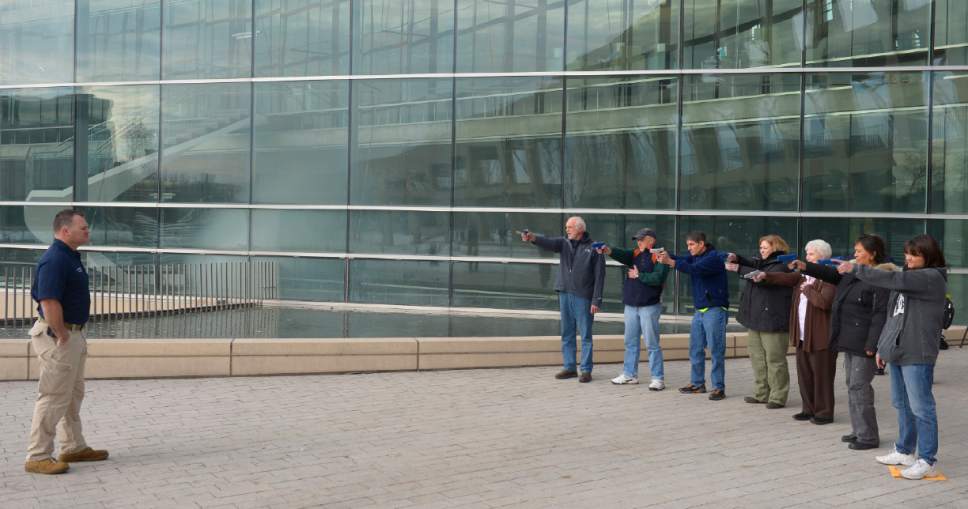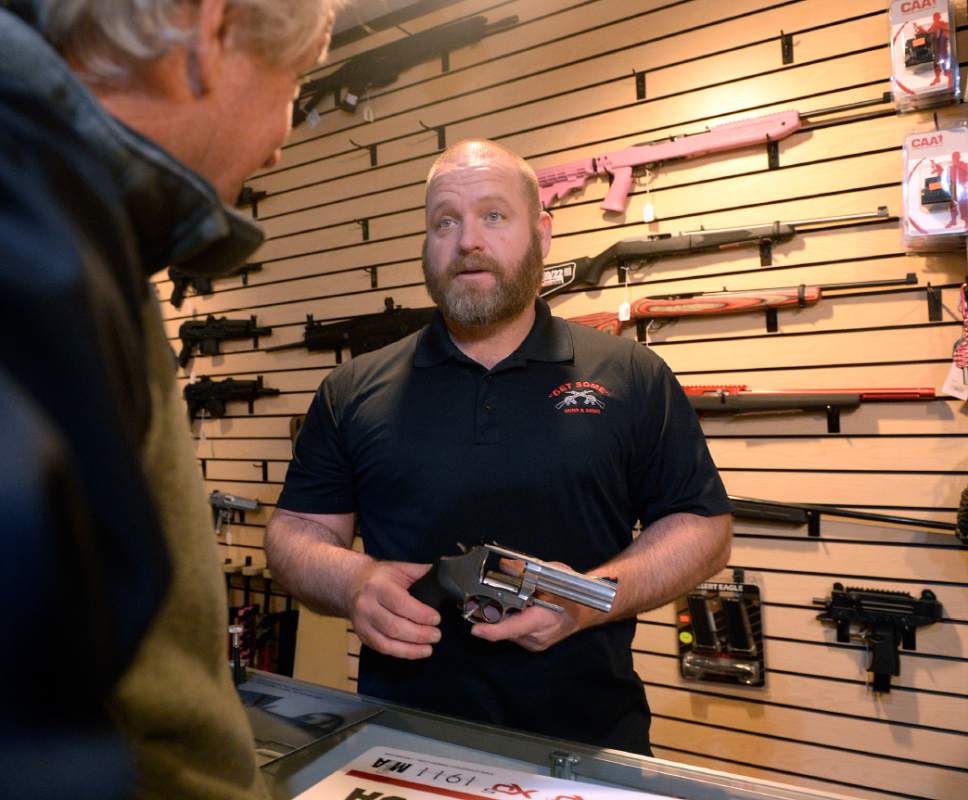This is an archived article that was published on sltrib.com in 2017, and information in the article may be outdated. It is provided only for personal research purposes and may not be reprinted.
Utah is generally seen as a gun-friendly place.
State gun laws are permissive, more than 230,000 residents hold concealed-weapon permits, and there's a long tradition of vigorous political support for the Second Amendment right to bear arms.
That might lead to a perception that nearly every Utahn has a firearm at his or her side.
But it would be wrong.
A recent Salt Lake Tribune-Hinckley Institute of Politics poll shows that more than half Utah's registered voters — 52 percent — say they don't own a gun.
"Wow that shocks me," said Jean Hill, the government liaison for the Catholic Diocese of Salt Lake City. "If you listen to our Legislature, you would think everyone's got a gun, and it's no big deal."
The number even surprised Clark Aposhian, chairman of the Utah Shooting Sports Council and the face of the state's gun lobby.
"We have 3 million people in Utah and a third of those are 18 or under, yet we still have a higher-than-average number of [concealed weapon] permits per capita than other states," he said, before adding that he wondered whether poll respondents answered honestly. As a group, Aposhian said, gun owners can be hesitant to talk about their weapons.
Perhaps of no surprise, however: The survey found that the share of Utahns who do own weapons — 46 percent — is significantly higher than the rate of personal gun ownership reported in multiple national polls.
A 2013 Pew Research Center poll found 31 percent of all Americans own guns. A Gallup survey from the same year placed that number at 28 percent, and 22 percent of 4,000 respondents to a Harvard/Northeastern University survey released in September 2016 reported owning guns.
The Utah poll was conducted March 15-21 by Dan Jones & Associates among 605 registered voters statewide and has a margin of error of 3.98 percentage points.
"There is less stigma against gun ownership in Utah," said Aposhian, who noted Utah makes it easy to buy and then carry those weapons. "We don't put up unnecessary roadblocks to stifle the ability to carry firearms like you see in other states."
—
Nation and state • Nationally, the number of households with weapons has been steadily shrinking over the past four decades, even as the number of guns owned by individuals has risen.
Gun sales in 2016 were at an all-time high with nearly 25 million in sales, according to the gun sales background checks conducted by the FBI.
Based on their survey, Harvard/Northeastern researchers estimate that just 3 percent of all adults own about half the U.S. gun supply, which as of 2015 was believed to total 270 million firearms.
Utah data appear to reflect that national trend: Overall, fewer people own weapons, but they own more of them.
Of the 277 gun-owning respondents to the Tribune/Hinckley poll, 44 percent said they have between two and five firearms. Thirteen percent said they own up to 10 guns, and 12 percent own more than 10.
Men outpace women in overall gun ownership — 55 percent to 36 percent.
Most armed Utahns — 73 percent — said they use their guns for hunting and shooting sports, while 53 percent said their weapons are for self-protection. Another 21 percent of respondents reported being gun collectors. The numbers add up to more than 100 percent, Dan Jones pollsters said, because some respondents cite more than one reason for ownership.
Utah's numbers are, again, higher than those found in national surveys. Pew found that 48 percent of Americans own guns for personal safety reasons and 39 percent use theirs for hunting or sport shooting.
—
Sport and safety • Survey respondent Judy Steinau lives in a Woodruff home with at least seven guns, weapons she said her husband uses only for hunting.
"We like food that doesn't have chemicals in it, so we appreciate wild game," said Steinau, who grew up in a Minnesota household of hunters. "We eat everything we get."
The Utah poll figures differ from national rates only among those between ages 18 and 34, who report lower gun-ownership rates, but a higher-than-average rate of self-protection concerns. Eighty-eight percent of poll respondents aged 18 to 24, for example said they don't own guns, but 75 percent of those reported they have the weapons for safety reasons.
Zane Westover, a software developer and U.S. Army veteran from Lehi, falls into the category of those who own guns for more than one reason, including target shooting and collecting and safety. His collection includes bolt-action rifles, semi-automatic rifles and handguns and a shotgun.
"I do feel safer," the father of three said. "To me, its a self-defense issue. And not just self-defense against an intruder in my home, but the self-defense of the state defending itself against the federal government."
Overall, the majority of Utah's gun owners were men between ages 45 and 64, who reported being politically conservative. Fifty percent of Republicans say they own guns, while 70 percent of those who identify as Democrats do not, and 55 percent of those who reported no political affiliation were not gunowners, according to the poll.
The data found no significant gun-ownership patterns among different religious groups, although about two-thirds of respondents who said they are not religious do not own guns — a much larger proportion than various faith groups.
The Utah poll also found strong opposition to any laws that would prohibit the manufacture, sale or possession of assault rifles, regardless of demographic group, including age, gender, political or religious affiliation.
Overall, 60 percent of Utahns oppose such bans and 36 percent support them.
"I find that disturbing," said Hill. "I think ultimately it shows how successful the gun lobby has been in scaring people into thinking they need military-grade weapons to protect themselves from nonexistent threats."
Steinau, a political independent, shares Hill's concern and said that although she knows people who own assault rifles, she does not "hear a good argument" for owning them.
"They were manufactured to kill people and to be used by the military," she said.
"I don't think they were ever intended to be in the hands of the person down the road. I think we should go back to the days of black powder. You could still kill people, but you won't kill 30 people if you have to take the time to load the gun."
jdobner@sltrib.com
@jenniferdobner





